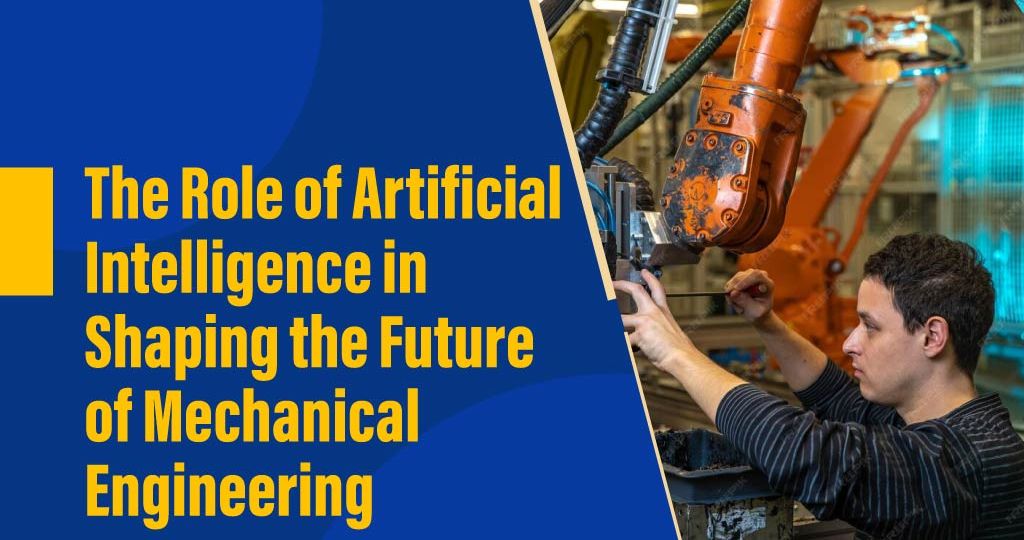
In mechanical engineering like in other industries, artificial intelligence has emerged as a key factor fostering innovation. The area of mechanical engineering is transforming as a result of the incorporation of AI, which increases precision, productivity, and innovation. For those looking to delve into this innovative field, enrolling in one of the top 10 mechanical engineering colleges in Coimbatore can provide the foundational knowledge and cutting-edge skills required to excel. This blog examines how artificial intelligence is influencing mechanical engineering in the future, stressing its uses, advantages, and revolutionary potential.
How AI Transforms Mechanical Engineering?
Enhancing Design and Simulation
Design and simulation are two areas where AI in mechanical engineering is having the most effects. In the past, engineers created and tested designs using CAD software and hard calculations. However, AI-powered tools now provide generative design, which involves algorithms producing efficient design alternatives based on preset limitations and requirements. This speeds up the design process and frequently produces creative solutions that would not occur to human designers.
AI improves simulation procedures as well. High-precision predictions of the behavior of materials and structures under different conditions can be made by machine learning algorithms. Because of its capacity for prediction, testing and iteration may be done more quickly and effectively, using fewer physical prototypes and saving time and money.
Predictive Maintenance and Fault Detection
Through defect identification and predictive maintenance, artificial intelligence is transforming maintenance tactics. Artificial intelligence systems can forecast when a component is likely to break and plan maintenance before a breakdown happens by evaluating data from sensors built into machines. This strategy lowers maintenance costs dramatically, increases equipment lifespan, and minimizes downtime.
Real-time anomaly detection is another capability of machine learning models, which helps to see possible problems before they become more serious ones. AI, for example, may keep an eye on temperature, vibrations, and other operating factors to spot changes from the usual, allowing engineers to proactively resolve problems.
Optimization of Manufacturing Processes
Artificial Intelligence is helping to optimize operations in the industrial sector. Large volumes of data from production lines are analyzed by intelligent algorithms to find inefficiencies and provide fixes. This may result in improved waste management, improved quality control, and increased general efficiency.
Automation and robotics powered by AI are also revolutionizing the manufacturing industry. These systems are capable of doing repetitive tasks with extreme accuracy and instantly adapting to changing circumstances. Cobots, or collaborative robots, assist human operators in manufacturing settings to increase efficiency and security.
Innovations in Material Science
AI is driving advancements in material science, a critical area in mechanical engineering. By leveraging machine learning, researchers can discover new materials with desired properties more rapidly than traditional experimental methods. AI algorithms can predict the behavior of materials under different conditions, aiding in the development of materials that are stronger, lighter, and more durable.
For example, AI can assist in designing composites with optimal properties for specific applications, such as aerospace or automotive industries. This accelerates the development of high-performance materials that meet stringent industry requirements.
Smart Manufacturing and Industry 4.0
The concept of Industry 4.0, characterized by the integration of digital technologies into manufacturing, is heavily influenced by AI. Smart factories utilize AI to create a connected and intelligent manufacturing ecosystem. In such environments, machines communicate with each other, exchange data, and make autonomous decisions to optimize production processes.
AI-driven systems enable real-time monitoring and control of production, ensuring that every aspect of the manufacturing process is finely tuned for maximum efficiency. This level of automation and intelligence leads to higher production rates, lower costs, and improved product quality.
Augmented Reality and Virtual Reality in Manufacturing
In mechanical engineering, AI is improving AR and VR capabilities. Immersion experiences for design, prototyping, and training are made possible by these technologies. Engineers with a B.Tech in AI and Data Science may perform virtual walkthroughs of designs, simulate real-world settings, and visualize complex assembly using AR and VR.
By offering real-time data analysis and decision-making support in AR and VR settings, AI improves these experiences. AI, for instance, can instantly recommend design changes based on its analysis of stress spots in a virtual prototype, enhancing the interaction and effectiveness of the design process.
Energy-Efficiency and Sustainability
In mechanical engineering, AI helps with sustainability and energy efficiency. Energy consumption in manufacturing processes and machinery operations is optimized by intelligent systems. AI can find ways to cut emissions, utilize less energy, and enhance sustainability overall by evaluating data from several sources.
Artificial Intelligence is utilized in the renewable energy industry to maximize the efficiency of solar panels, wind turbines, and other renewable energy devices. To optimize energy generation, machine learning algorithms forecast weather patterns and modify the functioning of these systems.
Challenges and Ethical Considerations
Even though artificial intelligence has enormous advantages for mechanical engineering, there are obstacles and moral issues to be resolved. Adopting AI necessitates large training and technical investments. Furthermore, the use of AI in key decision-making raises questions about accountability, transparency, and possible biases in algorithms.
Clear rules and norms must be established for AI development and use to ensure its ethical use. Maintaining human control and making sure AI systems are developed and applied in a way that is consistent with moral and ethical standards are vital.
Mechanical engineering is changing as a result of artificial intelligence. AI has a significant and wide-ranging impact on a variety of fields, including design and simulation, manufacturing process optimization, and material science breakthroughs. Significant improvements will be brought about by the ongoing evolution of technology, which will improve the efficiency, inventiveness, and sustainability of mechanical engineering. Shaping a future where engineering and technology work together to improve human progress will require embracing AI’s potential while resolving its problems and ethical issues. For aspirants who are passionate about this technology, enrolling in one of the best mechanical engineering colleges in Tamilnadu can provide the foundational knowledge and skills needed to excel in this dynamic and evolving field.
